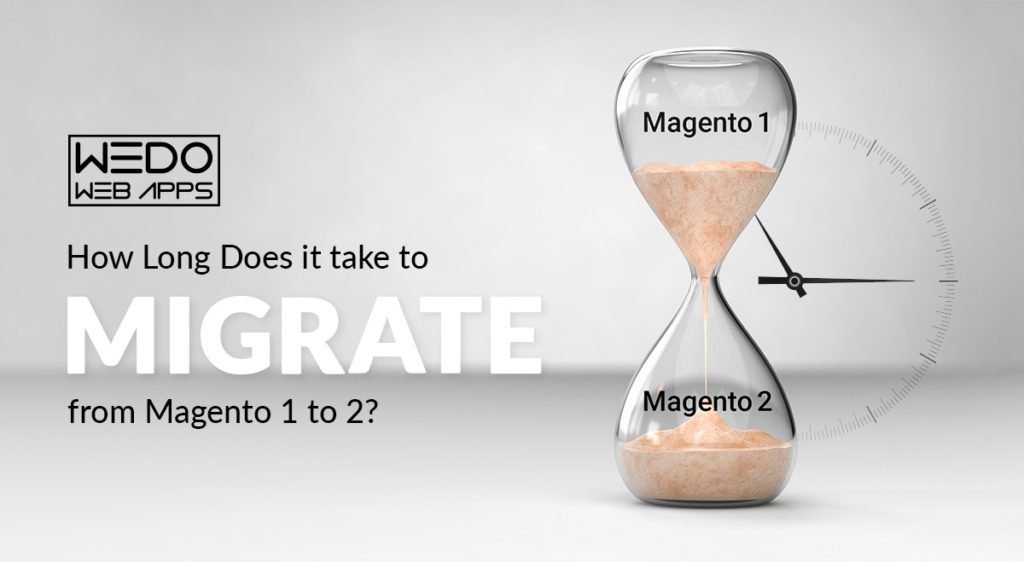15 Mar, 2023 | Magento development
How Long Does It Take To Migrate From Magento 1 To 2?

Factors That Affect Magento 1 to Magento 2 Migration Timings
1. Size of the Store
The size of the store plays a crucial role in determining the time it takes to migrate from Magento 1 to Magento 2. Small stores with few products and simple functionalities may take less time compared to large stores with a vast number of products and complex functionalities.2. Customizations
Customizations made on the Magento 1 platform will affect the migration process. It can range from simple changes to the site design to complex customizations that involve third-party integrations. The more complex the customizations, the more time it will take to migrate to Magento 2.3. Data
Data migration is a very critical process when it comes to migrating from Magento 1 to Magento 2. The amount of data to be migrated and its complexity will affect the time it takes to complete the migration process. Data includes customer information, order history, product information, and content.4. Extensions
Extensions are used to enhance the functionality of the Magento platform. The number and complexity of extensions installed on Magento 1 will affect the time it takes to migrate to Magento 2.5. Theme
The theme used on the Magento 1 site will also affect the migration process. If the theme is custom-built, it may require additional work to migrate to Magento 2.How Long Does It Take to Migrate from Magento 1 to Magento 2?
The time it takes to migrate from Magento 1 to Magento 2 varies depending on the factors mentioned above. However, the average time it takes to complete the migration process ranges from a few weeks to several months.Magento 1 to Magento 2 Migration Process With Timelines
The following is a breakdown of the Magento 1 to Magento 2 migration process and the estimated time it takes for each stage:1. Planning and Preparation Stage
This stage involves outlining the scope of the project, defining goals, and identifying the resources required. It also involves preparing the Magento 2 site, installing necessary extensions, and setting up the site theme. This stage takes approximately 1–2 weeks.2. Data Migration Stage
This stage involves migrating data from Magento 1 to Magento 2. It includes customer data, product data, order history, and other essential data. The time it takes to migrate data depends on the complexity and amount of data to be migrated. This stage takes approximately 1–3 weeks.3. Customization Stage
This stage involves customizing the Magento 2 site to meet the specific needs of the business. It includes setting up payment gateways, shipping methods, tax rules, and other site functionalities. The time it takes to complete this stage depends on the complexity of the customizations required. This stage takes approximately 2–6 weeks.4. Testing and Deployment Stage
This stage involves testing the Magento 2 site for any issues and ensuring that everything works correctly. Once everything is working correctly, the site is deployed to the live server. This stage takes approximately 1–2 weeks.
This stage takes approximately 1–2 weeks.
5. Post-Migration Stage
This stage involves monitoring the site's performance after the migration process and fixing any issues that may arise. This stage can last from a few weeks to several months, depending on the complexity of the site and the number of issues that need to be addressed. Overall, the Magento 1 to Magento 2 migration process takes anywhere from 6 to 16 weeks, depending on the complexity of the site and the factors mentioned above.Common Issues Encountered During the Migration Process From Magento 1 to Magento 2
The migration process can be complex, and businesses may encounter several issues that can increase the time for your migration process. The following are some of the common issues that businesses may encounter during the migration process:1. Compatibility Issues
Some extensions, themes, or customizations may not be compatible with Magento 2, which can cause errors during the migration process. It is important to identify these issues during the pre-migration checklist and find suitable alternatives.2. Data Integrity Issues
During the migration process, data can become corrupted or lost, which can cause issues with the store's functionality. It is essential to perform a test migration and verify the data after the migration process.3. Configuration Issues
Magento 2 has a different configuration structure than Magento 1, which can cause issues during the migration process. It is important to ensure that the Data Migration Tool is configured correctly to avoid configuration issues.Why Migrate From Magento 1 to Magento 2 ?
Migrating from Magento 1 to Magento 2 can offer several benefits to online store owners. Some of the benefits include1. Improved Performance
Magento 2 offers improved performance, faster loading times, and better scalability compared to Magento 1. This can lead to an increase in site speed and a better user experience.2. Enhanced Security
Magento 2 is more secure than Magento 1, with regular security updates and patches. This can help protect your site and customer data from potential security breaches.3. Better Mobile Experience
Magento 2 offers a responsive design, which means that your site will look great on any device. This can help improve the mobile user experience and increase customer engagement.4. Improved Admin Panel
Magento 2 offers an improved admin panel, with a streamlined interface, better navigation, and improved functionality. This can help improve the efficiency of store management and streamline day-to-day operations.
Choosing the Right Magento 2 Migration Expert
Choosing the right Magento 2 migration expert is critical to ensuring a smooth and successful migration process. Here are some factors to consider when selecting a migration expert: 1. Experience: Look for a migration expert with significant experience in migrating from Magento 1 to Magento 2. Check their portfolio and testimonials from previous clients to ensure that they have a track record of successful migrations. 2. Technical Expertise: The migration process involves technical expertise in various areas such as data migration, customization, and testing. Ensure that the migration expert has the necessary technical skills and knowledge to handle your store's migration. 3. Cost: The cost of migration can vary significantly depending on the complexity of your site. Obtain detailed quotes from several migration experts and compare them to choose the one that offers the best value for your budget. 4. Communication: Communication is crucial during the migration process. Ensure that the migration expert has clear and open communication channels and is responsive to your queries and concerns. By considering these factors of Magento 2 Cost, you can choose the right Magento 2 migration expert to ensure a successful migration process. WeDoWebApps LLC have highly skilled professionals which can reduce your migration time at an affordable cost. With an experience of over a decade, they are ready to flourish your business and needs with their personalized resources.Conclusion
Migrating from Magento 1 to 2 is essential to ensure the store's security and functionality. However, the migration process can be complex and time-taking. By following the pre- and post-migration checklists and understanding the factors that can affect the migration timeline, businesses can ensure a smooth transition to Magento 2. It is important to plan ahead and allocate sufficient time and resources for the migration process to ensure a successful outcome.Frequently Asked Questions
Yes, it is necessary to migrate to Magento 2 as Magento 1 is no longer supported, which can lead to security risks and functionality issues. Moreover, Magento 2 offers enhanced features and improved performance, providing a better customer experience for online shoppers. It takes around 6 to 16 weeks to do Migration properly from Magento 1 to Magento 2.
It is possible to migrate from Magento 1 to Magento 2 on your own, but it is not recommended unless you have the necessary technical skills and experience. The migration process is complex and involves multiple stages, including data migration, customization, and testing. It is best to hire a Magento 2 migration expert to ensure a smooth and successful migration.
Yes, there is a risk of data loss during the migration process, as data can become corrupted or lost. However, businesses can minimize this risk by performing a test migration and verifying the data after the migration process. It is also very crucial to take regular backups of the store's data before and after the migration process.
If you do not migrate from Magento 1 to Magento 2, your site will become vulnerable to security breaches and other issues. Magento 1 is no longer supported, which means that there will be no security updates or patches. This can put your site and your customer's data at risk. Additionally, you will not be able to take advantage of the new features and functionalities offered by Magento.
The cost of migrating from Magento 1 to Magento 2 depends on various factors, including the size of the store, customizations, and the complexity of the data. The price can range from a few thousand to tens of thousands of dollars. It is best to obtain a detailed quote from a Magento 2 migration expert to understand the cost involved.

